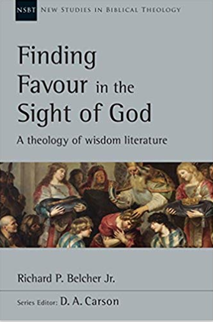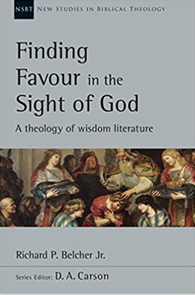| I was recently asked for a reading recommendation to supplement an introductory study of the book of Proverbs. Though I have found commentaries by David Hubbard, Tremper Longman III, Bruce Waltke, and others helpful in dealing with particular aspects of Proverbs, I have had difficulty finding an introduction that provides a helpful structure of the book and a meaty "big picture" introduction. My searches lead me to "Finding Favor in the Sight of God" by Richard P. Belcher Jr. and below I have provided an assessment of this tool. |
The first thing I would note is that the footnotes provided in “Finding Favor in the Sight of God” are invaluable and well worth the price of the volume. Belcher’s scholarship and research are illuminated in his use of primary and secondary resources and he has provided the reader will find an extensive list and critique of reference materials on Proverbs and related studies. Why reinvent the wheel and waste a lot of money on unknown materials when a reliable source provides you with a list of tools?
Belcher's book provides an introduction to Wisdom Literature in general and Proverbs, Job, and Ecclesiastes in particular. I have not yet read the portions that deal with Job and Ecclesiastes, so I will not comment on those portions except to state that if they provide a fraction of what is found in the Proverbs portion they will be worth the read.
The first chapter deals with the difficulties and benefits of Wisdom literature in the Old Testament. Belcher addresses issues of authorship, origin, genre, theology, difficulty, hermeneutics, and relevance. One of the most helpful parts of the book’s introduction is its focus on Wisdom literature’s emphasis on observation and creation. Part of the purpose of Wisdom literature is to draw understanding from what is knowable through creation and the creation order. God speaks to His creation through the orderliness of creation itself and therein lays one of Wisdom’s greatest arguments. Though not designed exclusively for apologetic purposes, the Wisdom literature of the Bible forces the reader to grapple with the nature of the Creator and what it means to be made in His image.
The three chapters dedicated to the book of Proverbs deal primarily with structural, hermeneutic, and thematic content of the book. Belcher convincingly establishes in chapter one that Proverbs 1-9 is a self-contained unit that provides a set of lens through which to approach the rest of the book. As randomly as the latter half of the book may appear to be at times, the first nine chapters are quite ordered and provide a clear explanation of the eleven lectures and four teachings of Lady Wisdom. Life’s obstacles are identified, Wisdom is personified (Lady Wisdom), and her ways are justified. The wisdom that was in the beginning of creation is shown to be present in the creation and embodied in the Creator (John 1:18).
Belcher’s second chapter on Proverbs tackles difficulties associated with interpreting proverbs. Literary and canonical context are both discussed at length and the unique genre of a proverb is contrasted with the genre of law. Belcher presents a persuasive case that proverbs are an application of wisdom rather than iron-clad rules that fit every situation. Belcher defends his position of genre by discussing the difficulty of contradicting and dueling proverbs and showing wisdom’s requirement for different approaches in different circumstances.
The final chapter on Proverbs addresses three theological themes that run throughout the book: The Sovereignty of God, the order of creation and its implications, and the scope of life (both present and eternal). The order of creation provides an introduction to the concept of Natural Law and places of large portion of Proverbs under that heading. Though the order of creation is identified as a source of wisdom, the corruption of that order through sin is also identified as a stumbling block and a reason for needing special revelation (Positive Law). The discussion of special revelation culminates in a brief refutation of a commonly held position that the Old Testament (and the book of Proverbs in particular) does not address the concept of life after death, while at the same time building a positive case for Proverb’s elucidation of the topic.
Assessment and Benefits:
Finding Favor in the Sight of God provides a meaty to Proverbs without becoming pedantic; it is neither fluffy nor dense but balanced and provocative. It successfully whets the appetite, builds confidence, provides a foundation, produces awe, and challenges the reader to pursue wisdom through the unending depths of Proverbs. Before engaging in a study of the book as a whole on either a congregational or individual level, I would highly recommend obtaining a copy of this work and giving it a reflective read.



 RSS Feed
RSS Feed
